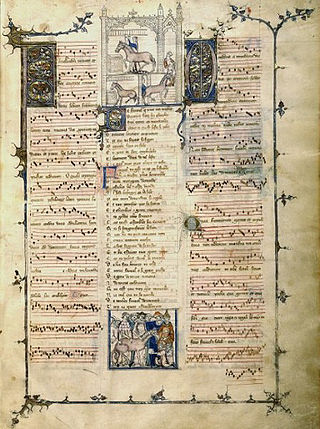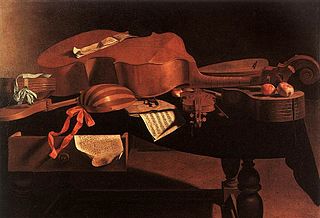
Early music generally comprises Medieval music (500–1400) and Renaissance music (1400–1600), but can also include Baroque music (1600–1750). Originating in Europe, early music is a broad musical era for the beginning of Western classical music.

Renaissance music is traditionally understood to cover European music of the 15th and 16th centuries, later than the Renaissance era as it is understood in other disciplines. Rather than starting from the early 14th-century ars nova, the Trecento music was treated by musicology as a coda to Medieval music and the new era dated from the rise of triadic harmony and the spread of the contenance angloise style from Britain to the Burgundian School. A convenient watershed for its end is the adoption of basso continuo at the beginning of the Baroque period.
The Trecento Madrigal is an Italian musical form of the 14th century. It is quite distinct from the madrigal of the Renaissance and early Baroque, with which it shares only the name. The madrigal of the Trecento flourished ca. 1340–1370 with a short revival near 1400. It was a composition for two voices, sometimes on a pastoral subject. In its earliest development it was simple construction: Francesco da Barberino in 1300 called it a "raw and chaotic singalong".

Ars antiqua, also called ars veterum or ars vetus, is a term used by modern scholars to refer to the Medieval music of Europe during the High Middle Ages, between approximately 1170 and 1310. This covers the period of the Notre-Dame school of polyphony, and the subsequent years which saw the early development of the motet, a highly varied choral musical composition. Usually the term ars antiqua is restricted to sacred (church) or polyphonic music, excluding the secular (non-religious) monophonic songs of the troubadours, and trouvères. Although colloquially the term ars antiqua is used more loosely to mean all European music of the 13th century, and from slightly before.

Ars nova refers to a musical style which flourished in the Kingdom of France and its surroundings during the Late Middle Ages. More particularly, it refers to the period between the preparation of the Roman de Fauvel (1310s) and the death of composer Guillaume de Machaut in 1377. The term is sometimes used more generally to refer to all European polyphonic music of the fourteenth century. For instance, the term "Italian ars nova" is sometimes used to denote the music of Francesco Landini and his compatriots, although Trecento music is the more common term for the contemporary 14th-century music in Italy. The "ars" in "ars nova" can be read as "technique", or "style". The term was first used in two musical treatises, titled Ars novae musicae by Johannes de Muris, and a collection of writings attributed to Philippe de Vitry often simply called "Ars nova" today. Musicologist Johannes Wolf first applied to the term as description of an entire era in 1904.
A Baroque orchestra is an ensemble for mixed instruments that existed during the Baroque era of Western Classical music, commonly identified as 1600–1750. Baroque orchestras are typically much smaller, in terms of the number of performers, than their Romantic-era counterparts. Baroque orchestras originated in France where Jean-Baptiste Lully added the newly re-designed hautbois (oboe) and transverse flutes to his orchestra, Les Vingt-quatre Violons du Roi. As well as violins and woodwinds, baroque orchestras often contained basso continuo instruments such as the theorbo, the lute, the harpsichord and the pipe organ.
Marchetto da Padova was an Italian music theorist and composer of the late medieval era. His innovations in notation of time-values were fundamental to the music of the Italian ars nova, as was his work on defining the modes and refining tuning. In addition, he was the first music theorist to discuss chromaticism.

Antonio "Zacara" da Teramo was an Italian composer, singer, and papal secretary of the late Trecento and early 15th century. He was one of the most active Italian composers around 1400, and his style bridged the periods of the Trecento, ars subtilior, and beginnings of the musical Renaissance.
An early music revival is a renewed interest in music from ancient history or prehistory. The general discussion of how to perform music from ancient or earlier times did not become an important subject of interest until the 19th century, when Europeans began looking to ancient culture generally, and musicians began to discover the musical riches from earlier centuries. The idea of performing early music more "authentically", with a sense of incorporating historically accurate performance practice, was more completely established in the 20th century, creating a modern early music revival that continues today.

Classical music generally refers to the art music of the Western world, considered to be distinct from Western folk music or popular music traditions. It is sometimes distinguished as Western classical music, as the term "classical music" also applies to non-Western art music. Classical music is often characterized by formality and complexity in its musical form and harmonic organization, particularly with the use of polyphony. Since at least the ninth century it has been primarily a written tradition, spawning a sophisticated notational system, as well as accompanying literature in analytical, critical, historiographical, musicological and philosophical practices. A foundational component of Western culture, classical music is frequently seen from the perspective of individual or groups of composers, whose compositions, personalities and beliefs have fundamentally shaped its history.
Ars Antiqua Austria is an early music ensemble founded in Linz in 1989 to perform Austrian Baroque music on period instruments. The group was established by Gunar Letzbor and Michael Oman and consists of eight musicians. They research and perform neglected works.

The Flanders Recorder Quartet was a professional recorder group based in Belgium.
In the years centering on 1600 in Europe, several distinct shifts emerged in ways of thinking about the purposes, writing and performance of music. Partly these changes were revolutionary, deliberately instigated by a group of intellectuals in Florence known as the Florentine Camerata, and partly they were evolutionary, in that precursors of the new Baroque style can be found far back in the Renaissance, and the changes merely built on extant forms and practices. The transitions emanated from the cultural centers of Northern Italy, then spread to Rome, France, Germany, and Spain, and lastly reached England . In terms of instrumental music, shifts in four discrete areas can be observed: idiomatic writing, texture, instrument use, and orchestration.
František Sláma was a Czech chamber music performer. He was the first Czech cellist who focused on Early music.
Giovanni Priuli was a Venetian composer and organist of the late Renaissance and early Baroque periods. A late member of the Venetian School, and a contemporary of Claudio Monteverdi, he was a prominent musician in Venice in the first decade of the 17th century, departing after the death of his associate Giovanni Gabrieli and ending his career at the Habsburg court in Austria. His music straddled the dividing-line between Renaissance and Baroque idioms.
Renaissance Ensemble Serbia is the first early music ensemble in Serbia and the second in south-eastern Europe, having been founded in 1968. Ensemble Renaissance usually focuses on the music of the Middle ages, Renaissance and Baroque. Occasionally, however, Ensemble performs modern music on ancient instruments.

Baroque music refers to the period or dominant style of Western classical music composed from about 1600 to 1750. The Baroque style followed the Renaissance period, and was followed in turn by the Classical period after a short transition. The Baroque period is divided into three major phases: early, middle, and late. Overlapping in time, they are conventionally dated from 1580 to 1650, from 1630 to 1700, and from 1680 to 1750. Baroque music forms a major portion of the "classical music" canon, and is widely studied, performed, and listened to. The term "baroque" comes from the Portuguese word barroco, meaning "misshapen pearl". The works of George Frideric Handel and Johann Sebastian Bach are considered the pinnacle of the Baroque period. Other key composers of the Baroque era include Claudio Monteverdi, Domenico Scarlatti, Alessandro Scarlatti, Alessandro Stradella, Antonio Vivaldi, Tomaso Albinoni, Johann Pachelbel, Henry Purcell, Georg Philipp Telemann, Jean-Baptiste Lully, Jean-Philippe Rameau, Marc-Antoine Charpentier, Arcangelo Corelli, François Couperin, Johann Hermann Schein, Heinrich Schütz, Samuel Scheidt, Dieterich Buxtehude, and others.

Modo Antiquo is an Italian instrumental ensemble dedicated to the performance of Baroque, Renaissance, and Medieval music. It was founded in 1984 by Federico Maria Sardelli. Twice nominated for a Grammy award, the ensemble has an extensive discography, primarily on the Naïve, Brilliant Classics, and Tactus labels and have given the first performances in modern times of several works by Vivaldi. Modo Antiquo's larger ensemble is its Baroque orchestra led by Sardelli. It also has a smaller ensemble devoted to Medieval and Renaissance music led by Bettina Hoffmann.

Bettina Hoffmann is a German viola da gambist and cellist, musicologist, and music pedagogue. A specialist in Renaissance, and Medieval music, she is the leader of the Renaissance and Medieval ensemble of Modo Antiquo. She has an extensive discography, primarily on the Brilliant Classics and Tactus labels and participated in two Grammy-nominated recordings.










